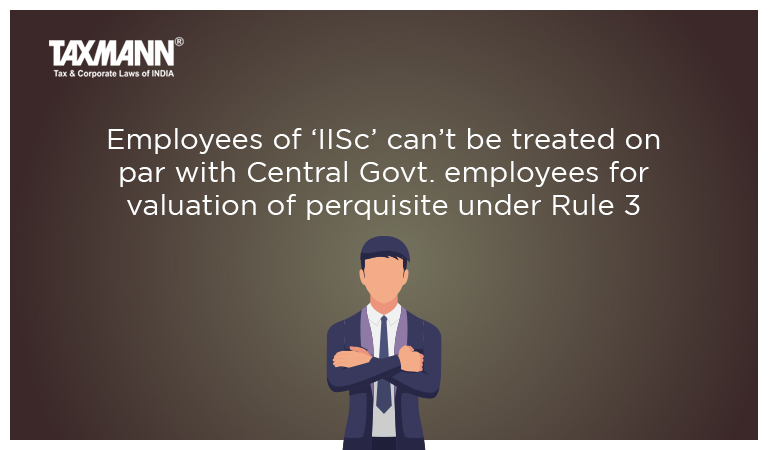Employees of ‘IISc’ can’t be treated on par with Central Govt. employees for valuation of perquisite under Rule 3
- Blog|News|Income Tax|
- 2 Min Read
- By Taxmann
- |
- Last Updated on 24 August, 2022

Case Details: Indian Institute of Science v. DCIT - [2022] 141 taxmann.com 354 (SC)
Judiciary and Counsel Details
-
- M.R. Shah & B.V. Nagarathna, JJ.
-
Arvind P. Datar, Sr. Adv. Ms Kavita Jha, AOR & Anant Mann, Adv. for the Petitioner.
Facts of the Case
For the purposes of valuation of perquisite of rent-free accommodation or concessional rent accommodation under section 17(2) read with Table I of Rule 3, employees of Indian Institute of Science cannot be treated at par with Central/State Government employees even if petitioner (Indian Institute of Science) may be considered as a State instrumentality within the definition of Article 12 of the Constitution of India. Merely because the petitioner might have adopted the Central Government Rules and/or the pay-scales etc., by that itself, it cannot be said that the petitioner is a Central/State Government.
Supreme Court Held
The Supreme Court upheld the findings and was in complete agreement with the view taken by the High Court. It was held by the High Court that even if the petitioner-Indian Institute of Science (IISc) may be considered as a State instrumentality within the definition of Article 12 of the Constitution of India, it cannot be treated at par with the Central/State Government employees under Table-I of Rule 3 of the Income Tax Rules, 1962.
Said rules apply to the Government employees to compute the value of perquisites under Section 17(2). Thus, merely because the petitioner might have adopted the Central Government Rules and/or the pay scales etc., by that itself, it cannot be said that the petitioner is a Central/State Government and its employees are Government employees.
Disclaimer: The content/information published on the website is only for general information of the user and shall not be construed as legal advice. While the Taxmann has exercised reasonable efforts to ensure the veracity of information/content published, Taxmann shall be under no liability in any manner whatsoever for incorrect information, if any.

Taxmann Publications has a dedicated in-house Research & Editorial Team. This team consists of a team of Chartered Accountants, Company Secretaries, and Lawyers. This team works under the guidance and supervision of editor-in-chief Mr Rakesh Bhargava.
The Research and Editorial Team is responsible for developing reliable and accurate content for the readers. The team follows the six-sigma approach to achieve the benchmark of zero error in its publications and research platforms. The team ensures that the following publication guidelines are thoroughly followed while developing the content:
- The statutory material is obtained only from the authorized and reliable sources
- All the latest developments in the judicial and legislative fields are covered
- Prepare the analytical write-ups on current, controversial, and important issues to help the readers to understand the concept and its implications
- Every content published by Taxmann is complete, accurate and lucid
- All evidence-based statements are supported with proper reference to Section, Circular No., Notification No. or citations
- The golden rules of grammar, style and consistency are thoroughly followed
- Font and size that’s easy to read and remain consistent across all imprint and digital publications are applied



 CA | CS | CMA
CA | CS | CMA
